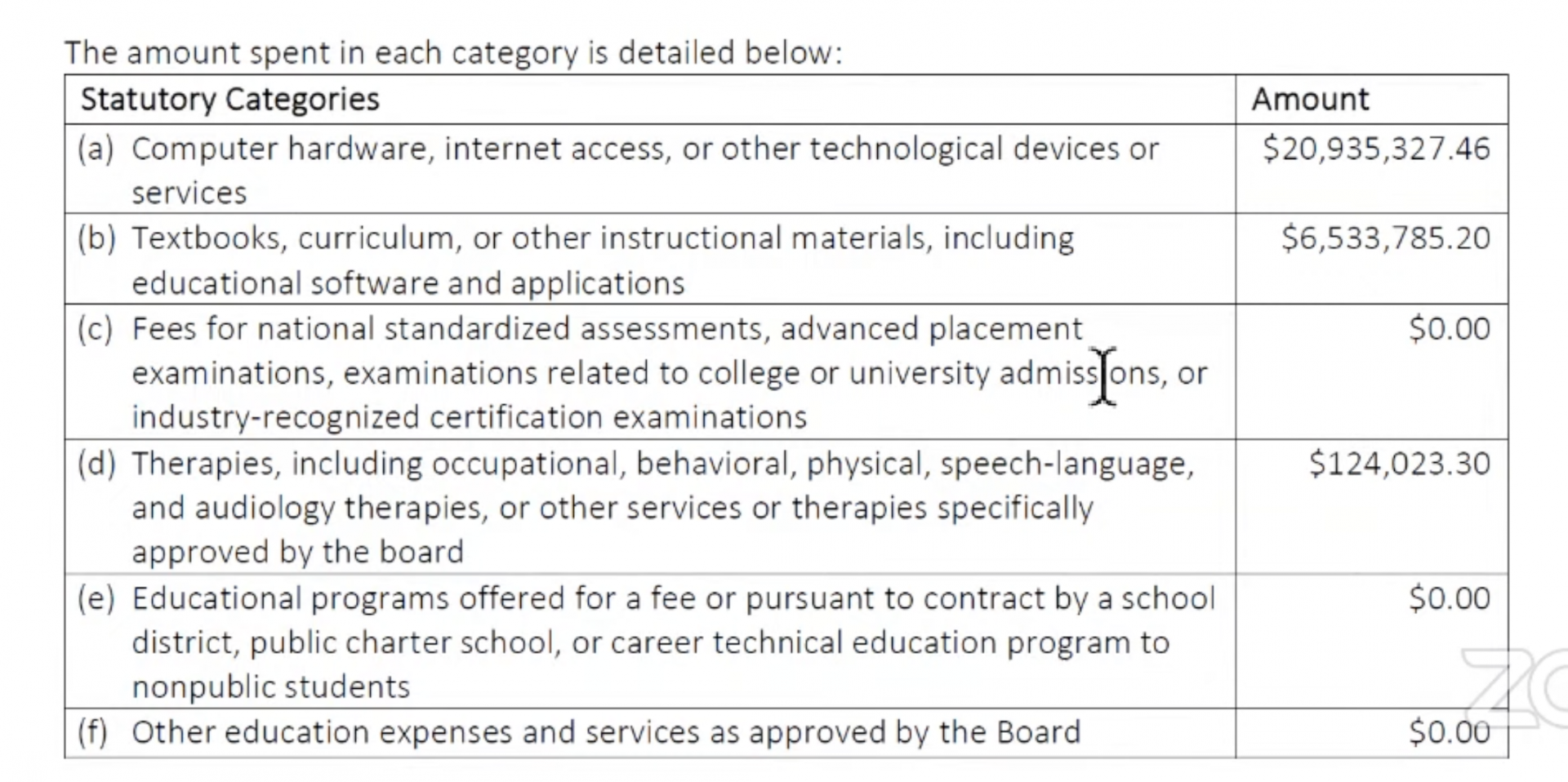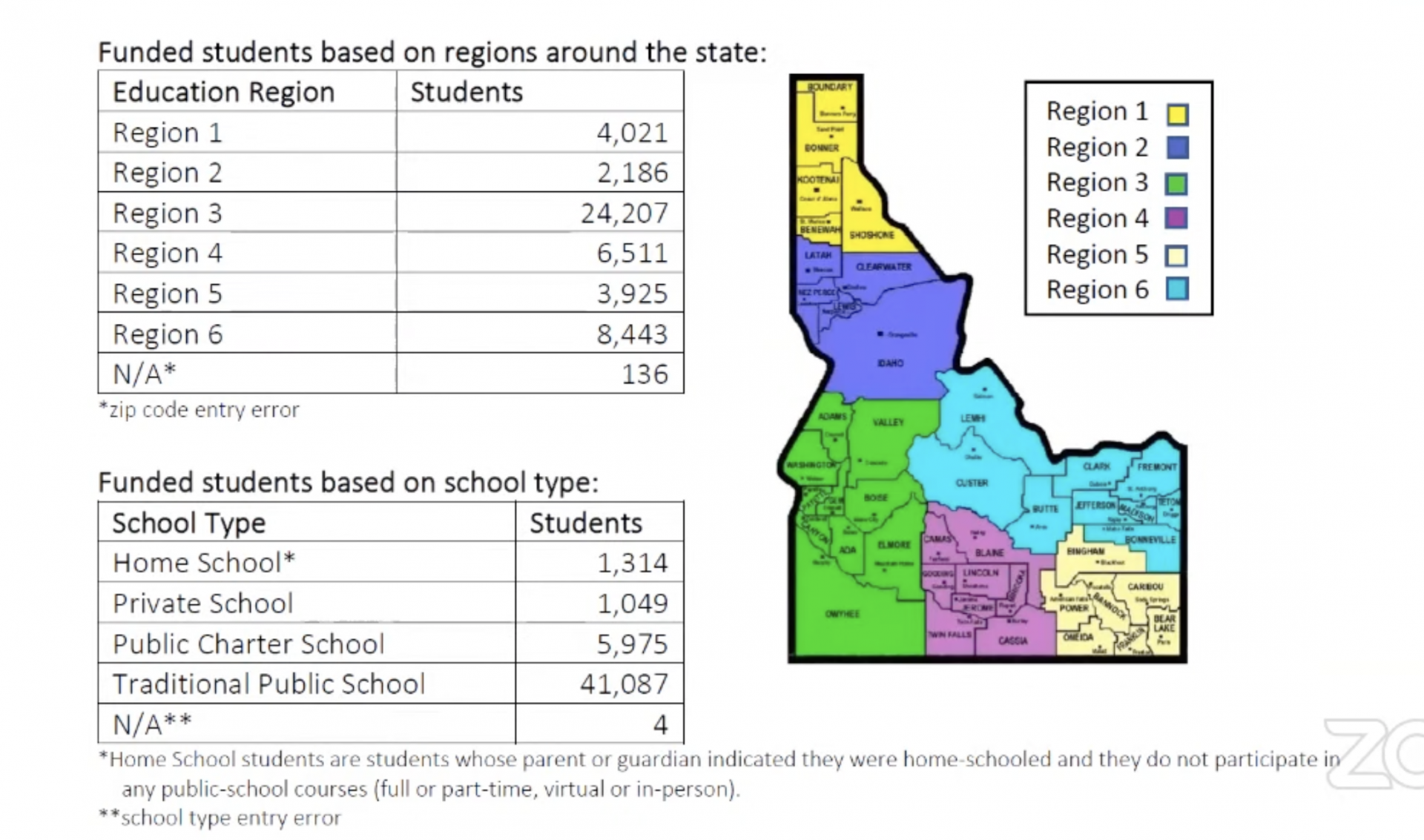Thursday marked the inaugural meeting of the newly formed advisory committee for Empowering Parents, a microgrant program designed to supplement out-of-pocket education costs for Idaho families.
The seven-member council — comprised of volunteers appointed by Gov. Brad Little, House Speaker Mike Moyle, and Senate Pro Tem Chuck Winder — will spend the summer traveling the state and seeking feedback on the program, which faces continued scrutiny. They hope to present a list of suggestions at the State Board of Education’s October meeting.
While Thursday’s three-hour inaugural meeting provided clarity on some aspects of the program, panelists left with more questions — and the state didn’t have clear answers.
Most grants funded technology, internet and other services
Empowering Parents provides $1,000 per-child scholarships (up to $3,000 per family) to eligible Idahoans. The money must be spent through an online portal on various approved services, like technology, therapy services, textbooks and other out-of-pocket expenses. Empowering Parents prioritizes low-income families, on a first-come, first-served basis.
According to State Board data, almost all of the $50 million of federal grant money went to eligible families, covering 49,429 students statewide. As of June, only $27.5 million has actually been spent — the remainder sits in recipients’ online accounts.
Of the money spent so far, nearly $21 million funded technology, internet and other services
The rest went to textbooks and curriculum, and therapy services. No money has been spent on academic testing, or to enroll homeschooled students in elective courses at public schools.

The data also outlined grant distributions.
Nearly half of the grants went to Treasure Valley families, and traditional public and charter school families received most of the money. Homeschool and private school families made up less than 2,500 grant recipients.

Over 10,000 of the roughly 37,000 applications were denied due to eligibility or timing issues, according to Heather Zeitlin, the State Board’s Empowering Parents grant coordinator. Zeitlin received 20 to 30 requests for appeal, but most were from ineligible applicants, who cannot appeal. One was upheld, after the state found a notification error within Odyssey, the program’s online platform.
Odyssey founder and CEO Joseph Connor attended the meeting virtually, and presented on the online vending process. Both Odyssey and the State Board approve all vendors and services, in line with Idaho law. Purchases must fall into in one of five statutory categories.
And Odyssey prioritizes local resources, Connor said. Over 300 of the 403 or so vendors on the platform are Idaho-based.
The data provided Thursday outlined broad details on the grants. But there’s more to come.
In April, the State Board launched an audit of online portal purchases, amid concerns that some money paid for ineligible items like televisions, clothing and smart watches. Zeitlin reported Thursday that she’s about 70% of the way through the audit.
She hopes to present results at the advisory panel’s July meeting.
Accountability, eligibility and categorization among panelists’ top concerns
Thursday’s presentations sparked a flurry of questions from the council, highlighting a few ambiguities within the program.
Several panelists raised accountability concerns.
A family with five kids — as pointed out by panelist Amy Henry of Nampa — could spend $3,000 on a laptop for any or all of their children, whether they are eligible or not. When asked if that would be a violation of the law, Zeitlin responded that she wasn’t sure.
“I don’t know how the State Board would monitor to that detail what is going on within that household,” she said.
“There needs to be more fiscal accountability,” said panelist Courtney Abenroth of Rupert. “It is free money, but nothing in life is free.”
Panelist Holly Cook of Boise questioned the categorization of eligible purchases. According to the State Board’s interpretation, the category for technology and computers also covers elective classes and fees for public school students under “services.”
Jenn Thompson, the State Board’s chief planning and policy officer, acknowledged the ambiguity. She suggested the panel use Section F — a section outlined in statute for the advisory panel to determine other eligible expenses — to clarify the categories.
“This is this is one of the things that…is going to be really important for us going forward,” Thompson said.
State Board Executive Director Matt Freeman pointed out another significant gap.
“Oddly enough, the statute does not require students to be Idaho residents,” Freeman said. “We had families who lived in border states whose students attended schools in Idaho, and so we had to approve those awards.”
Panelists also requested a slew of additional data from the State Board, including demographic breakdowns, urban vs. rural recipients, current account balances and a breakdown of services offered on the online platform. Abenroth asked for the terms and conditions for the grant program, along with demographic data specific to Native American tribes.
The advisory council’s next meetings will take place July 10 in Twin Falls, Aug. 17 in East Idaho and Sept. 21 in Lewiston. All will be open to public comment, as the panelists travel the state seeking feedback from parents.
State superintendent Debbie Critchfield, who serves as the nonvoting chair of the panel, said an online feedback option will be made available in coming weeks.
